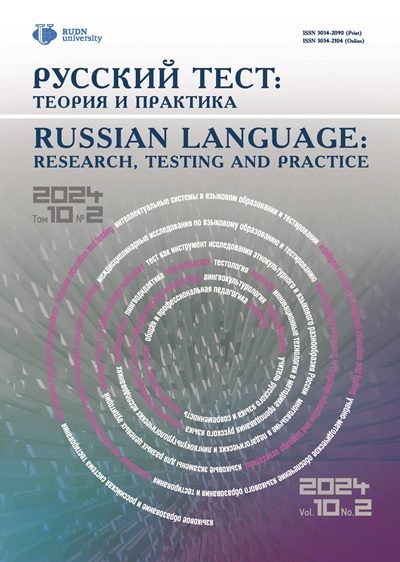“Russian made easy” innovative educational complex: Pre-university stage
- Authors: Shcherbakova O.M.1, Bragina M.A.1, Levina V.N.1, Kutyreva N.A.2
-
Affiliations:
- RUDN University
- Russian Center of Science and Culture in Hanoi (Representative office of Rossotrudnichestvo)
- Issue: Vol 10, No 2 (2024)
- Pages: 106-117
- Section: Language education and testing: educational and methodological support
- URL: https://journals.rudn.ru/russian-test/article/view/41100
- DOI: https://doi.org/10.22363/3034-2090-2024-10-2-106-117
- EDN: https://elibrary.ru/LSTXLB
Cite item
Full Text
Abstract
The study presents an overview of a new educational publication offering an innovative methodological system of teaching Russian as a foreign language. Special attention is paid to methodological approaches and solutions that provide qualitatively new opportunities to improve the effectiveness of teaching Russian to foreign audiences at the levels of pre-university training (A1-B1). The intensification and high efficiency of training are provided by a system of proposed and consistently implemented innovative methodological approaches and solutions. Each lesson includes a list of conversational topics, which ensures the variability of learning, the maximum repeatability of the studied language material, the expansion of the speech and communicative experience of students and the creation of an unlimited number of their combinations. The real communicative needs of the addressee are presented in the form of a set of intentions of the speaker, which are introduced much earlier than is generally accepted. When selecting them, their communicative value and high learning potential for mastering communicative tactics are taken into account. “Russian made easy” educational complex offers the author’s system of studying the prepositional and verbal systems of Russian test. The sequence of the introduction of language material is used as a resource for the intensification of learning.
Keywords
About the authors
Olga M. Shcherbakova
RUDN University
Email: shcherbakova-om@rudn.ru
ORCID iD: 0000-0002-0893-9771
PhD in Philology, Associate Professor, Senior Teacher of Additional Education, Department of Russian Language No. 1, Institute of Russian Language
Moscow, Russian FederationMarina A. Bragina
RUDN University
Email: bragina-ma@rudn.ru
ORCID iD: 0000-0001-7589-2726
PhD in Philology, Associate Professor, Head of Russian Language Department No. 1, Institute of Russian Language
Moscow, Russian FederationVera N. Levina
RUDN University
Author for correspondence.
Email: levina-vn@rudn.ru
ORCID iD: 0000-0002-3732-6990
Doctor of Philology, Associate Professor, Professor of Russian Language Department No. 1, Institute of Russian Language
Moscow, Russian FederationNatalia A. Kutyreva
Russian Center of Science and Culture in Hanoi (Representative office of Rossotrudnichestvo)
Email: natalkut2@gmail.com
PhD in Philology, Associate Professor, Head of Educational Projects Moscow, Russian Federation
References
- Fries, Ch.C. (1952). The structure of English. Hareourt, Brace and Co.
- Gak, V.G., & Roizenblit, E.B. (1965). Essays on comparative study of French and Russian tests. Moscow: Vysshaya shkola Publ. (In Russ.).
- Gegechkori, L.Sh. (1977). Adequate correlation of intuitive systemic-structural method of teaching languages. Communications of the Academy of Sciences of the Georgian SSR, 85(3), 737–739. (In Russ.).
- Gouin, F. (1880). The art of learning and studying foreign languages.
- Hagboldt, P. (1995). Language Learning. Some Reflections from Teaching Practice. Chicago, IL: University of Chicago Press.
- Kapitonova, T.I., & Shchukin, A.N. (1987). Modern methods of teaching Russian to foreigners. 2nd ed. Moscow. (In Russ.).
- Kitaigorodskaya, G.A. (1986). Methodology of intensive teaching. Moscow: Vysshaya shkola Publ. (In Russ.).
- Kobozeva, I.M. (2002). Towards recognition of the intentional component of the meaning of an utterance (theoretical prerequisites). Computer Linguistics and Intellectual Technologies (pp. 267–271). (In Russ.).
- Lado, R. (1964). Language teaching a scientific approach. New York.
- Lozanov, G. (1973). Suggestopedia in teaching foreign languages. Methods of Intensive Teaching of Foreign Languages, (1), 9–17. (In Russ.).
- Mitrofanova, O.D., & Kostomarov, V.G. (1990). Methods of teaching Russian as a foreign language. Moscow. (In Russ.).
- Ollendorff, H.G. (1877). Nouvelle methode pour apprendre a lire, a ecrire et a parler une langue en six mois, appliquee au russe. Paris.
- Passov, E.I. (1991). Communicative method of teaching foreign language speaking. 2nd ed. Moscow: Prosveshchenie Publ. (In Russ.).
- Pavlova, V.P. (1969). Psychological basis for intensifying the teaching of oral and written speech in a second language. Moscow. (In Russ.).
- Plesnevich, A.S. (1997). Course of training of scientific workers in oral foreign language speech using the “immersion” method. Reading. Translation. Oral Speech. Methodology and Linguistics (pp. 201–210). Leningrad. (In Russ.).
- Schwartz, J.E. (1974). Suggestion in the pedagogical process. [Abstract of Doctor Dissertation]. Moscow. (In Russ.).
- Shcherbakova, (2013). O.M. Textbook of Russian test for foreign medical students (I certification level of proficiency in RKI. Polylingualism and Transcultural Practices, (1), 135–140. (In Russ.).
- Shcherbakova, O.M., Bragina, M.A., & Levina, V.N. (2023). Russian made easy = TiẾng nga trôi chẢy: Textbook with translation into Vietnamese. B1. Moscow: Flinta Publ. (In Russ.).
- Shcherbakova, O.M., Bragina, M.A., & Levina, V.N. (2024). Russian made easy. A1–A2 (study guide with translation into Vietnamese). Russian as a foreign language. Moscow: Flinta Publ. (In Russ.).
- Shcherbakova, O.M., Bragina, M.A., Levina, V.N., & Mikheeva, E.S. (2022). Russian made easy = TiFng nga trôi chGy: Textbook with translation into Vietnamese. A2. Moscow: Flinta Publ. (In Russ.).
- Shekhter, Yu.I. (2005). Living language. Moscow: Rektor Publ. (In Russ.).
- Wagner, V.N. (1988). National-oriented methodology in action. Russian Test Abroad, (1), 70–75. (In Russ.).









